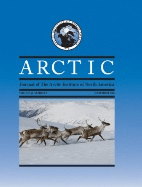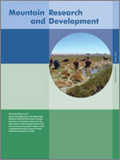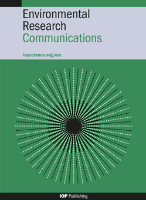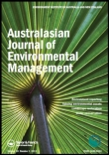
ARCTIC
Scope & Guideline
Fostering Dialogue on Arctic Challenges and Solutions
Introduction
Aims and Scopes
- Interdisciplinary Research:
The journal emphasizes research that crosses traditional disciplinary boundaries, integrating insights from ecology, anthropology, geography, and social sciences to provide a holistic view of Arctic issues. - Indigenous Knowledge and Perspectives:
A core focus is on incorporating Indigenous knowledge systems and perspectives, particularly in relation to environmental stewardship, subsistence practices, and cultural heritage. - Climate Change and Environmental Studies:
The journal frequently publishes studies on the impacts of climate change on Arctic ecosystems, wildlife, and human communities, aiming to understand and address these pressing challenges. - Sustainable Development and Resource Management:
Research on sustainable practices, resource management, and economic development in Arctic communities is a significant aspect of the journal, reflecting the need for balance between development and conservation. - Policy and Governance:
The journal explores governance frameworks and policies affecting the Arctic, including Indigenous rights, environmental regulations, and international relations, to inform better decision-making.
Trending and Emerging
- Climate Resilience and Adaptation Strategies:
A growing focus on how Arctic communities and ecosystems can adapt to climate change, including innovative practices and resilience-building strategies, is increasingly evident in recent studies. - Food Security and Sovereignty:
Research exploring food security issues, particularly within Indigenous communities, is on the rise, emphasizing the importance of local food systems and cultural practices in the face of environmental changes. - Community-Based Participatory Research:
There is an increasing trend towards community engagement in research, where local knowledge and participation are prioritized, reflecting a shift towards more inclusive and collaborative research methodologies. - Technological Innovations in Environmental Monitoring:
Emerging studies are focusing on the use of new technologies for monitoring ecological changes in the Arctic, highlighting the integration of traditional methods with modern scientific approaches. - Intersections of Health and Environment:
Recent publications are increasingly examining the connections between environmental changes and health outcomes in Arctic populations, underscoring the need for interdisciplinary research that addresses social determinants of health.
Declining or Waning
- Historical Analysis of Arctic Expeditions:
There has been a noticeable reduction in publications focusing solely on historical narratives of Arctic exploration and expeditions, suggesting a shift toward contemporary issues and their implications. - Traditional Ecological Knowledge (TEK) Alone:
While Indigenous knowledge remains a vital aspect of the journal, the standalone discussions of TEK without integration into broader ecological or social contexts have diminished, reflecting a preference for interdisciplinary approaches. - Single-Species Focus in Wildlife Studies:
Research that concentrates solely on individual species without considering ecosystem interactions or broader environmental contexts seems to be less frequent, indicating a move towards more comprehensive ecological studies.
Similar Journals

MOUNTAIN RESEARCH AND DEVELOPMENT
Connecting research and development in mountainous regions.MOUNTAIN RESEARCH AND DEVELOPMENT is a premier open-access journal dedicated to advancing the understanding of mountain environments and communities through rigorous research and interdisciplinary collaboration. Published by the International Mountain Society since 1981, this journal serves as a vital resource for researchers, professionals, and students in the fields of development, environmental science, and environmental chemistry. With a commendable impact factor reflected in its Q2 and Q3 quartile rankings in 2023 across various categories, it offers a platform for innovative studies that address the unique challenges facing mountainous regions globally. As a vital conduit for knowledge exchange, MOUNTAIN RESEARCH AND DEVELOPMENT fosters the dissemination of research findings, insights, and practical applications aimed at enhancing the sustainability and resilience of mountain ecosystems. Its open-access model, implemented since 2009, ensures that research is accessible to a broad audience, contributing to the ongoing dialogue in mountain studies and related fields. For detailed inquiries, the journal is hosted at the University of Bern, Switzerland.

Environmental Research Communications
Fostering collaboration for a greener planet.Environmental Research Communications is a distinguished open-access journal published by IOP Publishing Ltd, focusing on cutting-edge research within the environmental sciences. With an ISSN of 2515-7620, this journal serves as a vital platform for the dissemination of pivotal studies that address urgent environmental issues. Since its inception in 2019, Environmental Research Communications has positioned itself as a reputable source of knowledge, achieving a Q1 ranking in various categories, including Agricultural and Biological Sciences and Earth-Surface Processes, indicating its significant impact in these fields. The journal boasts impressive Scopus ranks, ensuring visibility and recognition among global scholars. With open access options, it encourages a broader readership and fosters collaboration across disciplines, making it an essential resource for researchers, professionals, and students dedicated to advancing the understanding and preservation of our environment.

Australasian Journal of Environmental Management
Empowering voices in the realm of environmental stewardship.The Australasian Journal of Environmental Management is a highly regarded publication in the field of environmental studies, published by Taylor & Francis Ltd. With an ISSN of 1448-6563 and an E-ISSN of 2159-5356, this journal serves as a pivotal platform for disseminating innovative research and insights pertaining to the management of environmental resources across Australia and broader geographical contexts. The journal has achieved impressive rankings, including a Q2 classification in Geography, Planning and Development and a Q3 in Management, Monitoring, Policy and Law for 2023, highlighting its relevance and impact within the academic community. Researchers and professionals are encouraged to contribute to its mission of advancing knowledge and practices in sustainable environmental management. With a publication history spanning from 1996 to 2024, the journal remains committed to fostering interdisciplinary collaboration and critical discourse on environmental challenges. While access options may vary, the significance of this journal as a resource for students and practitioners alike cannot be overstated, as it shapes contemporary perspectives on environmental policy and management.

Novos Cadernos NAEA
Innovating research pathways for societal and environmental impact.Novos Cadernos NAEA is a prominent open-access journal published by Universidade Federal do Pará, dedicated to advancing the field of applied social sciences and environmental studies. Since its inception in 1998, this journal has established itself as a vital platform for researchers and practitioners to disseminate innovative research, engage in scholarly conversations, and promote interdisciplinary approaches to contemporary issues affecting society and the environment. With an ISSN of 1516-6481 and an E-ISSN of 2179-7536, it aims to enhance accessibility to knowledge by ensuring that all articles are freely available online, thereby supporting the global academic community. The journal's commitment to quality research is evident, making it an essential resource for scholars, students, and policymakers looking for cutting-edge analysis and insights in their fields.

One Ecosystem
Empowering research that shapes sustainable practices and policies.One Ecosystem is a leading academic journal published by PENSOFT PUBLISHERS, dedicated to advancing the understanding of ecosystems through interdisciplinary research. Since its inception in 2016, this Open Access journal has fostered accessibility to vital scientific findings, facilitating the global exchange of knowledge in the fields of Agricultural and Biological Sciences, Earth and Planetary Sciences, and Ecology. With an impressive impact factor reflected in its Q1 and Q2 rankings across multiple categories as of 2023, including a noteworthy rank of 35/193 in the Agricultural and Biological Sciences (miscellaneous) field, One Ecosystem is positioned as a critical resource for researchers, professionals, and students seeking to deepen their understanding of ecological interactions and conservation strategies. The journal is based in Bulgaria, at 12 PROF GEORGI ZLATARSKI ST, SOFIA 1700, and continues to pave the way for innovative research that informs policy and education in ecological preservation and sustainable practices.

One Earth
Pioneering insights for a healthier, more sustainable Earth.One Earth is a premier academic journal published by Cell Press, dedicated to advancing research in the fields of Earth and Planetary Sciences as well as Environmental Science. With an impactful presence in the academic community and an impressive ranking, One Earth has achieved Q1 status in both Earth and Planetary Sciences and Environmental Science, showing its commitment to the highest standards of scholarly excellence. Founded in 2019, this journal has quickly established itself as a leading platform for groundbreaking research, contributing to the global conversation on sustainability and environmental stewardship. With a distinguished Scopus rank placing it in the 99th percentile among Earth and Planetary Sciences and the 97th percentile in General Environmental Science categories, One Earth aims to disseminate cutting-edge findings and foster innovative approaches to address pressing global challenges. The journal is indexed with an ISSN of 2590-3330 and an E-ISSN of 2590-3322, supporting a broad audience of researchers, professionals, and students passionate about ecological integrity and planetary health.

NORTHWEST SCIENCE
Empowering researchers with vital insights from the Northwest.NORTHWEST SCIENCE, published by the NORTHWEST SCIENTIFIC ASSOCIATION, serves as a vital resource for researchers and professionals in the fields of ecology, evolution, and systematics. With an ISSN of 0029-344X and an E-ISSN of 2161-9859, this journal has been disseminating valuable scientific insights since its inception in 1975 and continues to do so into 2024. Although currently positioned in the Q4 quartile for its category, it plays a crucial role in advancing the understanding of ecological and biological sciences, reflecting a diverse range of studies and methodologies. Researchers will find the journal particularly appealing due to its emphasis on regional studies and their implications on a global scale. While NORTHWEST SCIENCE is not an open-access publication, it provides significant contributions to the academic dialogue within its discipline, making it an essential addition to the library of any dedicated researcher, student, or professional in the environmental sciences.

Journal of Earth System Science
Bridging Knowledge Gaps in GeoscienceThe Journal of Earth System Science, published by Indian Academy of Sciences, is a pivotal resource in the field of Earth and Planetary Sciences, boasting an impressive Q2 ranking in 2023. Since its inception in 2005, this journal has been dedicated to advancing our understanding of complex Earth systems, publishing high-quality research that spans across various disciplines within the geosciences. With an E-ISSN of 0973-774X and a commitment to Open Access, it makes cutting-edge scientific insights widely available to researchers and professionals alike. The journal serves as a vital platform for innovative research and critical discussions, making significant contributions to the global scientific community, particularly as we navigate the challenges posed by climate change and environmental sustainability. Located in Bangalore, India, it continues to foster international collaboration and discourse among scholars, reinforcing its role as an essential publication within the Earth and Planetary Sciences domain.

Regional Environmental Change
Advancing Knowledge on Regional Ecosystem ChangesRegional Environmental Change, published by SPRINGER HEIDELBERG, is a leading journal dedicated to the critical field of Environmental Science, specifically focusing on the global and planetary changes affecting our regional environments. Since its inception in 2005 and continuing through 2024, the journal has been a pivotal platform for disseminating cutting-edge research, insights, and methodologies that address pressing environmental issues. With an impressive Scopus rank, placing it in the top 30% of journals in its category, Regional Environmental Change (ISSN: 1436-3798; E-ISSN: 1436-378X) showcases high-quality academic articles that engage with the multifaceted impacts of environmental shifts, providing researchers, professionals, and students with vital knowledge and data. Although the journal does not currently offer Open Access, it remains a crucial resource for those committed to understanding and mitigating the effects of environmental change on regional ecosystems and communities.

Environmental and Planning Law Journal
Navigating the Nexus of Law and EnvironmentEnvironmental and Planning Law Journal is a significant publication in the fields of law and environmental studies, published by LAWBOOK CO LTD in Australia. This journal, with the ISSN 0813-300X, has established itself as a crucial resource since its inception in 1984, providing a platform for scholarly discourse around legal frameworks affecting environmental planning and policy. Despite its coverage discontinuation in databases like Scopus, its impact remains recognized, achieving a rank of #455 in the Social Sciences Law category, indicating its relevance in legal scholarship. The journal is classified in the lower quartiles, yet it continues to address vital issues in geography, planning, and management of environmental law, engaging with contemporary challenges faced by policy-makers and practitioners. With no open access options currently available, the journal invites subscriptions and institutional access for its valuable content, making it a notable cornerstone for researchers, students, and professionals dedicated to navigating the complexities of environmental law and planning.